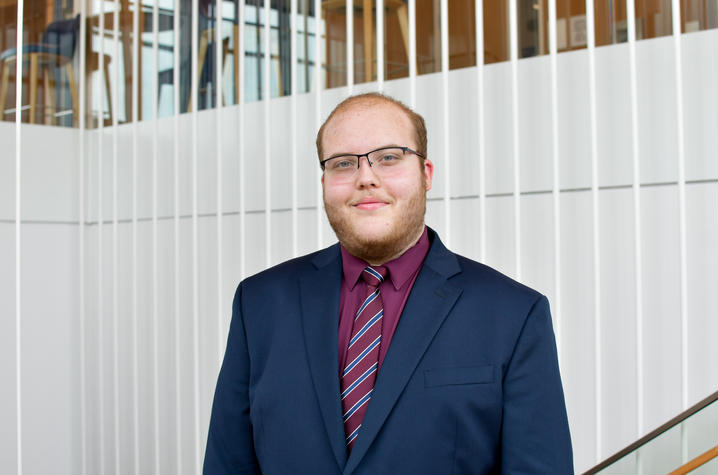Public Health student sets sights on law school to improve rural health

LEXINGTON, Ky. (July 14, 2025) — For University of Kentucky College of Public Health student John “JT” Maggard-Staton, growing up in Olive Hill, Kentucky, meant witnessing both the strength of a close-knit community and the challenges that come with living in a region with limited access to health care. Those early experiences fuel his drive to pursue a career that combines public health and law.
A public health major on the pre-law track, Maggard-Staton is dedicated to addressing health disparities through policy. With plans to attend law school after graduation, he seeks to serve communities like his own by helping shape laws that improve health outcomes for more Kentuckians.
“I chose the University of Kentucky because of its strong sense of community, as well as opportunities like the Appalachian Career Training in Oncology Program that align with my interests in health care and social impact,” Maggard-Staton said.
The Markey Cancer Center’s Appalachian Career Training in Oncology (ACTION) Program is a National Cancer Institute Youth Enjoy Science program that recruits and trains early-career undergraduate and high school students from Appalachian Kentucky in cancer research and clinical care. Throughout the program, students gain cancer research knowledge and skills through cross-disciplinary, faculty-mentored research experiences. They also have opportunities to shadow clinicians, participate in career development activities, and conduct outreach within their communities.
Maggard-Staton is one of the students who has completed both the high school and undergraduate portions, according to ACTION Director Nathan Vanderford, Ph.D., a Markey researcher and associate professor in the College of Medicine’s Department of Toxicology and Cancer Biology.
“I've known JT for several years now since he was a high schooler, and I know he’s thought about several different career paths,” Vanderford said. “It's been this classic transition as he was able to experience different career paths in ACTION that helped him understand what he's really interested in. And he truly has found a passion in public policy and public health.”
Vanderford expressed hope that students in the program pursue a wide range of career paths, emphasizing the need for professionals from many different fields to tackle Kentucky’s significant cancer challenges. The state currently holds the highest cancer incidence rate and the second-highest mortality rate in the nation, with particularly elevated numbers in the Appalachian counties where many ACTION students come from.
“The high cancer rates in Kentucky is why this program is so important because we need more people to help us address this major cancer problem from all these different angles, all these different career paths,” he said.
While initially on a pre-med track, Maggard-Staton’s focus shifted as he gained greater exposure to the systemic drivers behind health outcomes.
“I always imagined myself working directly with patients,” he said. “But over time, I started noticing deeper, systemic issues, especially in underserved communities. That led me to explore public health and, ultimately, policy.”
A pivotal moment in his journey came when he enrolled in Dr. Sarah Cprek’s Introduction to Public Health course.
“What stood out to me was how she tied real-world issues, like access to care and policy, into the core of public health,” he said. “It showed me how broad and impactful the field is and helped me realize this was the right path for me.”
He also credits CPH 255 Public Health: Careers for a Healthy World, taught by Professor Janie Cambron, as a turning point. He said the class focused on real challenges communities face.
“She brought in professionals from across the field and showed how public health connects to everything, which really stuck with me,” Maggard-Staton said.
As he took more classes and got involved in research, Maggard-Staton said his interests shifted toward the systems and policies that impact people’s health.
“That’s when I knew I wanted to combine public health and law,” he said.
With this focus in mind for law school, Maggard-Staton said he hopes to work in public service, especially in roles where he can influence health policy on a larger scale, through government, nonprofits or advocacy.
“My goal is to address disparities in health care and create policies that ensure everyone has access to care,” he said.
Maggard-Staton’s specific areas of interest include Medicaid, cancer research funding and substance use treatment. He said those are issues that directly affect vulnerable populations, especially in rural communities like his. The Olive Hill native believes that having public health voices in law and policy is essential.
“It’s crucial to have people with public health backgrounds in the legal and political fields,” he said. “They bring a unique perspective on how policies impact communities’ health and well-being.”
Maggard-Staton encourages students considering public health to stay curious by asking questions.
“If you see something that bothers you, don’t ignore it — learn about it,” he said. “That’s what public health is all about.”
Looking ahead, Maggard-Staton remains focused on impact.
“I want to use what I’ve learned to make things better,” he said. “Even if I can make a small change, that’s worth it to me.”
As the state’s flagship, land-grant institution, the University of Kentucky exists to advance the Commonwealth. We do that by preparing the next generation of leaders — placing students at the heart of everything we do — and transforming the lives of Kentuckians through education, research and creative work, service and health care. We pride ourselves on being a catalyst for breakthroughs and a force for healing, a place where ingenuity unfolds. It's all made possible by our people — visionaries, disruptors and pioneers — who make up 200 academic programs, a $476.5 million research and development enterprise and a world-class medical center, all on one campus.




